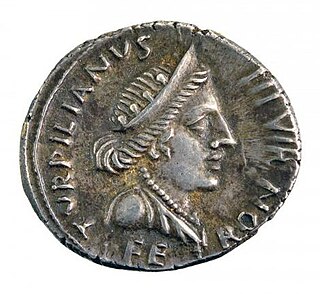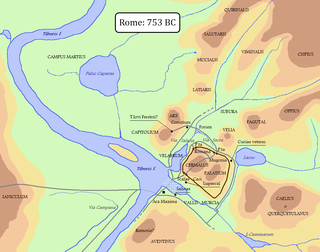Related Research Articles

Jupiter, also known as Jove, is the god of the sky and thunder, and king of the gods in ancient Roman religion and mythology. Jupiter was the chief deity of Roman state religion throughout the Republican and Imperial eras, until Christianity became the dominant religion of the Empire. In Roman mythology, he negotiates with Numa Pompilius, the second king of Rome, to establish principles of Roman religion such as offering, or sacrifice.

In ancient Roman religion, Ceres was a goddess of agriculture, grain crops, fertility and motherly relationships. She was originally the central deity in Rome's so-called plebeian or Aventine Triad, then was paired with her daughter Proserpina in what Romans described as "the Greek rites of Ceres". Her seven-day April festival of Cerealia included the popular Ludi Ceriales. She was also honoured in the May lustration (lustratio) of the fields at the Ambarvalia festival: at harvest-time: and during Roman marriages and funeral rites. She is usually depicted as a mature woman.

In Sabine and ancient Roman religion and myth, Luna is the divine embodiment of the Moon. She is often presented as the female complement of the Sun, Sol, conceived of as a god. Luna is also sometimes represented as an aspect of the Roman triple goddess, along with Diana and either Proserpina or Hecate. Luna is not always a distinct goddess, but sometimes rather an epithet that specializes a goddess, since both Diana and Juno are identified as moon goddesses.

Angitia was a goddess among the Marsi, the Paeligni and other Oscan-Umbrian peoples of central Italy. She was associated in antiquity with snake-charmers who claimed her as their ancestor. Roman interpretations probably obscure her Marsian significance.
Libitina, also Libentina or Lubentina, is an ancient Roman goddess of funerals and burial. Her name was used as a metonymy for death, and undertakers were known as libitinarii. Libitina was associated with Venus, and the name appears in some authors as an epithet of Venus.
In ancient Roman religion, Sancus was a god of trust, honesty, and oaths. His cult, one of the most ancient amongst the Romans, probably derived from Umbrian influences. Cato and Silius Italicus wrote that Sancus was a Sabine god and father of the eponymous Sabine hero Sabus. He is thus sometimes considered a founder-deity.

In ancient Roman religion and myth, Janus is the god of beginnings, gates, transitions, time, duality, doorways, passages, frames, and endings. He is usually depicted as having two faces. The month of January is named for Janus (Ianuarius). According to ancient Roman farmers' almanacs, Juno was mistaken as the tutelary deity of the month of January, but Juno is the tutelary deity of the month of June.

Juno was an ancient Roman goddess, the protector and special counsellor of the state. She was equated to Hera, queen of the gods in Greek mythology and a goddess of love and marriage. A daughter of Saturn and Ops, she was the sister and wife of Jupiter and the mother of Mars, Vulcan, Bellona, Lucina and Juventas. Like Hera, her sacred animal was the peacock. Her Etruscan counterpart was Uni, and she was said to also watch over the women of Rome. As the patron goddess of Rome and the Roman Empire, Juno was called Regina ("Queen") and was a member of the Capitoline Triad, centered on the Capitoline Hill in Rome, and also including Jupiter, and Minerva, goddess of wisdom.

In Etruscan and Sabine religion, Feronia was a goddess associated with wildlife, fertility, health, and abundance, also venerated by the Faliscans and later adopted into ancient Roman religion. As the goddess who granted freedom to slaves or civil rights to the most humble part of society, she was especially honored among plebeians and freedmen. Her festival, the Feroniae, was November 13 during the Ludi Plebeii, in conjunction with Fortuna Primigenia; both were goddesses of Praeneste.
In ancient Roman religion, Mana Genita or Geneta Mana is an obscure goddess mentioned only by Pliny, Plutarch, and Horace. Both Pliny and Plutarch tell that her rites were carried out by the sacrifice of a puppy or a bitch. Plutarch alone has left some examination of the nature of the goddess, deriving Mana from the Latin verb manare, "to flow", an etymology which the Roman grammarian Verrius Flaccus also relates to the goddess Mania mentioned by Varro, and to the Manes, the souls of the departed. In a Greek equivalence perspective, Plutarch, on account of the bitch sacrifice, loosely connects the goddess to Hekate and in parallel notes that Argive sacrificial practice makes as well for an interesting comparison for her with Eilioneia, meaning the birth goddess Eileithyia. Horace also links her to Eileithyia in carmen saeculare Some modern commentators have elaborated on the "Genita" and "Mana" qualifiers, to suggest she were a goddess who could determine whether infants were born alive or dead. Others have suggested that Horace may be referring to this goddess when he mentions a goddess Genitalis in the Carmen Saeculare. Some have compared it to the Oscan Deiua Geneta, while still others deem that Genita Mana may be only a vague epithet like Bona Dea rather than an actual theonym.

Arx is a Latin word meaning "citadel". In the ancient city of Rome, the arx was located on the northern spur of the Capitoline Hill, and is sometimes specified as the Arx Capitolina.

Vulcan is the god of fire including the fire of volcanoes, deserts, metalworking and the forge in ancient Roman religion and myth. He is often depicted with a blacksmith's hammer. The Vulcanalia was the annual festival held August 23 in his honor. His Greek counterpart is Hephaestus, the god of fire and smithery. In Etruscan religion, he is identified with Sethlans.

The Vinalia were Roman festivals of the wine harvest, wine vintage and gardens, held in honour of Jupiter and Venus. The Vinalia prima, also known as the Vinalia urbana was held on 23 April to bless and sample last year's wine and ask for good weather until the next harvest. The Vinalia rustica was on 19 August, before the harvest and grape-pressing.

The numerous epithets of Jupiter indicate the importance and variety of the god's functions in ancient Roman religion.

In ancient Roman religion and myth, the Querquetulanae or Querquetulanae virae were nymphs of the oak grove at a stage of producing green growth. Their sacred grove (lucus) was within the Porta Querquetulana, a gate in the Servian Wall. According to Festus, it was believed that in Rome there was once an oakwood within the Porta Querquetulana onto the greening of which presided the virae Querquetulanae.

In ancient Roman religion, a sacellum is a small shrine. The word is a diminutive from sacrum. The numerous sacella of ancient Rome included both shrines maintained on private properties by families, and public shrines. A sacellum might be square or round.

Numerius is a Latin praenomen, or personal name, usually abbreviated N. The name was never especially common, but was used throughout the period of the Roman Republic, and into imperial times. The feminine form is Numeria. The praenomen also gave rise to the patronymic gens Numeria.

The vocabulary of ancient Roman religion was highly specialized. Its study affords important information about the religion, traditions and beliefs of the ancient Romans. This legacy is conspicuous in European cultural history in its influence on later juridical and religious vocabulary in Europe, particularly of the Christian Church. This glossary provides explanations of concepts as they were expressed in Latin pertaining to religious practices and beliefs, with links to articles on major topics such as priesthoods, forms of divination, and rituals.
The Porta Pandana was an ancient Roman gateway in the original fortifications of the Capitoline Hill.
References
 This article incorporates text from a publication now in the public domain : Leonhard Schmitz (1870). Smith, William (ed.). Dictionary of Greek and Roman Biography and Mythology .
This article incorporates text from a publication now in the public domain : Leonhard Schmitz (1870). Smith, William (ed.). Dictionary of Greek and Roman Biography and Mythology .{{cite encyclopedia}}: Missing or empty|title=(help)